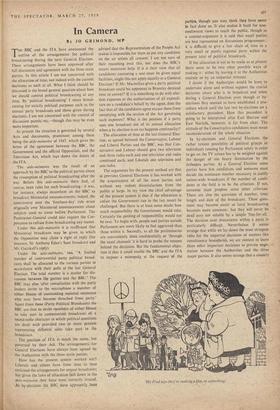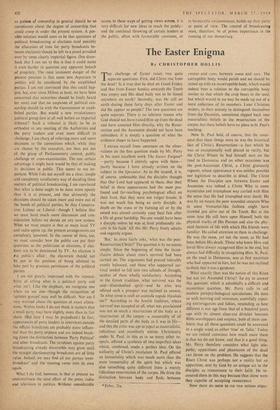In Camera
By JO GRIMOND, MP T,BBC and the ITA have announced the 1 outline of the arrangements for political broadcasting during the next General Election. These arrangements have been approved after full discussion and agreement with the three main parties. In this article I am not concerned with the allocation of time, nor indeed with the current decisions as such at all. What I think should be discussed is the broad generaf question about how we should control political broadcasting at any time. By 'political broadcasting' I mean broad- casting for strictly political purposes such as the annual party broadcasts and those given during elections. 1 am not concerned with the control of discussion panels, etc.—though this may be even more important.
At present the situation is governed by several Acts and documents, prominent among them being the aide-memoire of 1947, which-gives the terms of the agreement between the BBC, the Government and the official Opposition, and the Television Act, which lays down the duties of the ITA.
The aide-mentaire was the result of an approach by the BBC to the political parties about the resumption of political broadcasting after the war. Before this aide-memoire there had, of course, been rules for such broadcasting : it was, for instance, always incumbent on the BBC to broadcast Ministerial announcements; indeed, the controversy over the 'fourteen-day' rule arose originally over Ministerial announcements about subjects soon to come before Parliament. The Postmaster-General could also require the Cor- poration to refrain from broadcasting any matter.
Under this aide-mdmoire it is reaffirmed that Ministerial broadcasts may be given to which the Opposition may claim a right of reply (for instance, Sir Anthony Eden's Suez broadcast and Mr. Gaitskell's reply).
Under the aide-memoire,' too, 'A limited number of controversial party political broad- casts shall be allocated to the various parties in accordance with their polls at the last General Election. The total number is a matter for dis- cussion between the parties and the BBC.° The BBC 'may also 'after consultation with the party leaders invite to the microphone a member of either House of outstanding national eminence who may have become -detached from party.' Apart from these (Party. Political Broadcasts) the BBC are free to invite members of either House to take part in controversial broadcasts of a round-table character in which political questions are dealt with provided two or more persons representing different sides take part in the broadcasts.
The position. of ITA is much the same, but governed by their Act. The arrangements for General Elections have always been agreed by the Authorities with the three main parties.
How has the present system worked out? Liberals and others have from time to time criticised -the arrangements for annual broadcasts; but given the laws of allocation laid down in the aide-rnemoire they have been correctly treated. At by-elections the BBC have apparently been advised that the Representation of the People Act makes it impossible for them to put any candidate on the air unless all consent. I am not sure of their reasoning over this, nor does the BBC's recent statement help. If it is their view that all candidates contesting a seat must be given equal facilities, might this not apply equally at a General Election? If Mr. Macmillan gives a party political broadcast could his opponent in Bromley demand time to answer? if it is something to do with elec- tion expenses or the authorisation of all expendi- ture on a candidate's behalf by the agent, does the fact that all the candidates agree excuse them from complying with the section of the Act governing such expenses? What is the position if a party uses one broadcast out of its annual allocation when a by-election is on (as happens continually)?
The allocation of time at the last General Elec- tion, as agreed between the Conservative, Labour and Liberal Parties and the BBC, was that Con- servative and Labour should give two television and three radio each and one television and radio combined each, and Liberals one television and one radio.
The arguments for the present method are that at previous General Elections it has worked with the acquiescence of all the main parties and without any violent dissatisfaction from the public at large. In my view the chief advantage of the present system is that if the allocation is unfair the Government can in the last resort be challenged. But there is at least some doubt how much responsibility the Government would take. Certainly the pinning of responsibility would not be easy. To begin with, people and parties outside Parliament are more likely to feel aggrieved than those within it. Secondly, as all the preliminaries are conveniently done confidentially or 'through the usual channels' it is hard to probe the reasons behind the decisions. But the fundamental objec- tion is that it could enable the BBC and the ITA to impose a monopoly at the request of the parties, though you may think they have never in fact done so. It also makes it hard for non- conformist views to reach the public, though as a counter-argument it is said that small parties are best represented on discussions programmes: it is difficult to give a fair share of time to a very small or purely regional party within the present total of politiCal broadcasts.
If the allocation is not to be made as at present there seem to be two other possible ways of making it : either by leaving it to the Authorities entirely or by an impartial tribunal.
I doubt if the Authorities would be keen to undertake alone and without support the crucial decisions about who is to broadcast and when during a General Election even though at by- elections they seemed to have established a pro- cedure which until the last two by-elections set a satisfactory precedent. How this precedent is going to be interpreted after East Harrow and East Norfolk, however, is far from clear. The attitude of the Conservative candidates must mean reconsideration of the whole situation.
In by-elections and General Elections the rather remote possibility of political groups or individuals running for Parliament solely in order to get on the TV screen has to be weighed against the danger of too heavy domination by the orthodox parties. At a General Election some parties have few candidates and someone must decide the minimum number necessary to justify nation-wide broadcasts if the number of candi- dates in the field is to be the criterion. If not, someone must propose some other criterion. There are also the questions of number, time, length and date of the broadcasts. These ques- tions may become easier as local broadcasting becomes more common : but they will never be dead easy nor soluble by a simple 'free-for-all. The decision over dissentients within a party is particularly difficult. Nevertheless it seems strange that while we lay down the most stringent rules for the impartial decisions of matters like constituency boundaries, we are content to leave these other important decisions to private nego- tiation between the Authorities and the three major parties. It also seems strange that a country
'My Fred says they're making a film, or something.'
so jealous of censorship in general should be so complacent about the degree of censorship that could creep in under the present system. A pos- sible solution would seem to be that questions of political broadcasting at elections (and possibly the allocation of time for party broadcasts be- tween elections) should be left to a panel presided over by some clearly impartial figure. One draw- back that I can see to this is that it could make it even harder to question any apparent breach of propriety. The most imminent danger of the present position is that some new departure in politics will be smothered by the established parties. I am not convinced that this could hap- • pen, but, ever since Milton at least, we have been concerned that minorities should be freely heard (or seen) and that no suspicion of political cen- sorship should lie with the Government or estab- lished parties. But would a new revolutionary political group fare at all well before an impartial tribunal? Such a tribunal is likely to be as orthodox as any meeting of the Authorities and the party leaders and even more difficult to challenge. I am chary of referring more and more decisions to the committees which, while they are chosen by the executive, are then put out of the grasp of Parliamentary control, public challenge or cross-examination. The one certain advantage it might have would be that of making its decisions in public. This seems to me im- portant. While I do not myself see a clear, simple and completely satisfactory way of deciding these matters of political broadcasting, I am convinced that what is done ought to be done more openly than it is at present, and that ultimately the decisions should be taken more and more out of the hands of political parties, be they Conserva- tive, Labour or Liberal—though I believe that we must have much more discussion and con- sideration before we decide on any new system. What we must ensure is that as more local TV and radio opens up, the present arrangements are completely loosened. In the course of time, too, we must consider how the public can put their questions to the politicians at elections, if elec- , lions are, to be dominated by TV. An election is tile public's affair : the electorate should not be put in the position, of being allowed to take part by gracious permission of the political parties.
am not greatly impressed with the impossi- bility of telling what is a political party and what isn't. Like the elephant, we recognise one when we see one—though the recognition of 'splinter groups' may well be difficult. Nor am I very worried about the question of exact alloca- tions. Within limits 1 do not think it matters that a small party may have slightly more than its fair share. (But here I may be prejudiced.) In fact, appearances of party leaders in interviews outside the official broadcasts are probably more influen- tial than the party setpiece and are indeed break- ing down the distinction between 'Party Political' and other broadcasts. The revulsion against party broadcasting already discernible may grow until the straight electioneering broadcasts are of little value. Indeed, we may find all our parties 'over- broadcast' and the meeting come into its own again.
What I do feel, however, is that at present we underestimate the total effect of the press, radio and television in politics. Without considerable access to these ways of getting views across, it is very difficult for new ideas to reach the public: and the continual throwing of certain leaders at the public, often with favourable comment, or in favourable circumstances, builds up their party or point of view. The control of broadcasting must, therefore, be of prime importance in the running of our democracy.







































 Previous page
Previous page